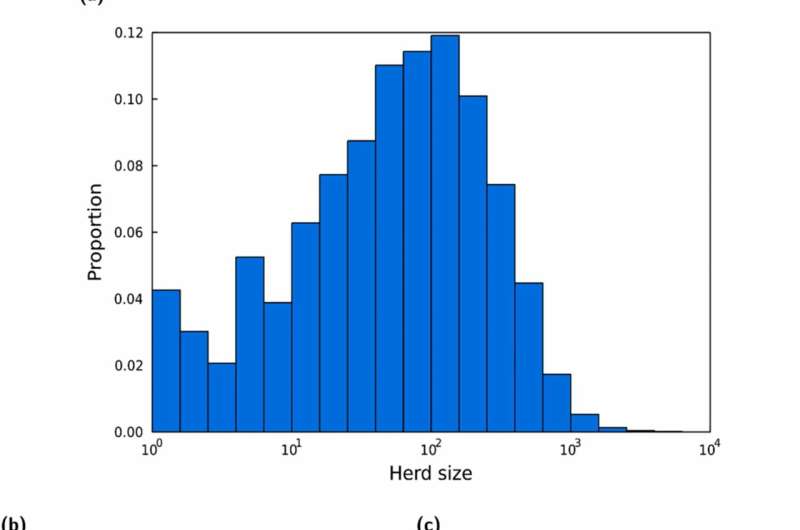This article has been reviewed according to Science X's editorial process and policies. Editors have highlighted the following attributes while ensuring the content's credibility:
fact-checked
trusted source
proofread
Farmer behavior found to play a crucial role in managing livestock diseases

A study published in Preventive Veterinary Medicine has shown how differences in farmer behavior can affect controlling the scale of disease outbreaks. Farmer behavior, especially vaccine uptake or other preventative measures, is critical to how effective responses are to livestock disease outbreaks, such as foot-and-mouth disease, bovine tuberculosis and bovine viral diarrhea.
The researchers, from the Universities of Nottingham and Warwick, say that the behavioral differences reported in the paper need to be taken into account when contingency planning or developing policy for future outbreaks.
The research team interviewed 60 cattle farmers from around the UK, investigating the farmer's vaccination decisions in an unfolding fast-spreading epidemic. The study found that prompt vaccination uptake was associated with high trust in the Government plans for disease control and having enough time and money to control the disease.
The team then incorporated this information into a mathematical model for the whole of the UK and studied how having knowledge of farmer behavior may impact disease outbreak predictions, compared to circumstances where differences in farmer behavior was ignored.
The researchers at the University of Nottingham's School of Veterinary Medicine and Health Sciences, and Warwick's Zeeman Institute for Systems Biology and Infectious Disease Epidemiology Research (SBIDER), have demonstrated the usefulness of modeling that has both epidemiological and socio-behavioral elements. The study reveals how omitting the diversity in individual farmers' disease management plans for livestock infections can hinder assessments of the likely national outcomes.
The value of the behavioral insight highlighted in this research could be extremely helpful in planning and administering national disease control strategies, enabling policymakers to determine the scale and cost of future livestock disease outbreaks more accurately.
Dr. Ed Hill, from the Warwick Mathematics Institute, University of Warwick, who co-authored the study, said, "Our quantitative study explores veterinary health associated behaviors, capturing individual and contextual factors. These data allow differences in farmer disease-management behaviors to be included into models of livestock disease transmission, which can help to inform veterinary health decision making."
Dr. Naomi Prosser from the University of Nottingham, added, "Understanding the specific factors associated with different behavioral responses of farmers to disease outbreaks will allow improved design of disease control strategies by taking these factors and the expected behavioral differences into account."
Dr. Hill added, "This pilot study has shown the power and necessity of combining epidemiological predictions with an assessment of farmer behavior. More work is now needed to understand how farmer's attitudes, perceptions, and beliefs—and therefore their likely behavior—will change over time. We also interested in understanding how behaviors are influenced by policy, advice and the actions of neighboring farmers."
More information: Edward M. Hill et al, Incorporating heterogeneity in farmer disease control behaviour into a livestock disease transmission model, Preventive Veterinary Medicine (2023). DOI: 10.1016/j.prevetmed.2023.106019
Provided by University of Nottingham




















